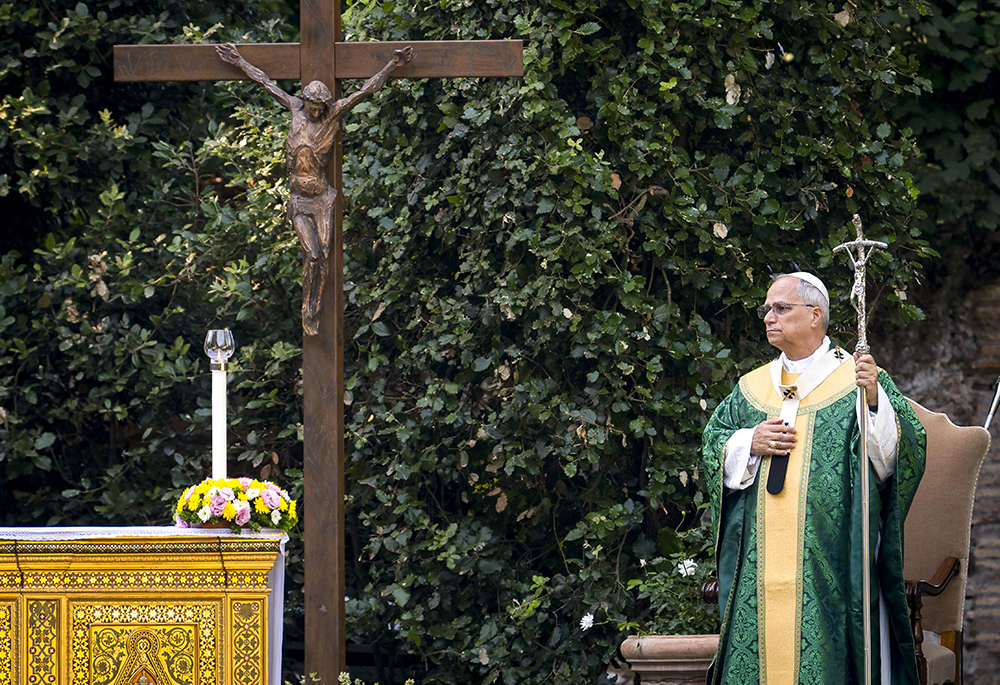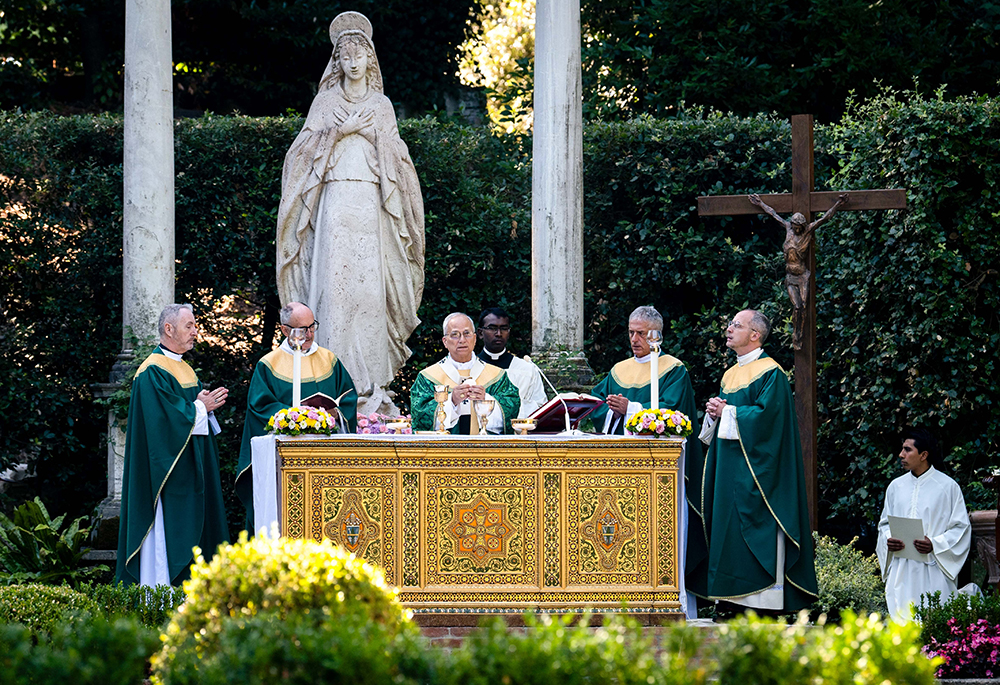
Pope Leo XIV holds his crosier as he celebrates Mass "for the care of creation" on the grounds of the Borgo Laudato Si' ecology center in Castel Gandolfo, Italy, July 9, 2025. (CNS/Cristian Gennari, pool)
Last week (July 3), Cardinal Michael Czerny presented a new formulary at a press conference at the Vatican formally announcing the addition of the Mass "for the care of creation" to the range of votive Masses approved for the Roman liturgy. When I first heard about a forthcoming votive Mass in honor of creation months earlier, I was very excited. As a theologian who has written on theology of creation and ecospirituality for decades, this is a subject matter that is near and dear to my Franciscan heart.
However, when I looked at the released prayers and reviewed the short interventions given to the press, I found myself somewhat disappointed. I want to be clear that I don't think it is bad; rather, this liturgy does not live up to the potential laid out in "Laudato Si', on Care for Our Common Home," or in the broader millennia-old tradition of theologies of creation. A lot of what I found lacking aligns with the insightful perspective offered by Teresa Berger, recently retired professor of liturgical studies at Yale Divinity School and Yale Institute of Sacred Music. I encourage readers to check out her short take, too.
Among the four things that Berger finds insufficient about what was released related to this new Mass, is something that rises to my number one concern: the persistence of anthropocentrism.
It's true that Pope Francis straddled the line in Laudato Si' between a stewardship model of creation that still centers humans as deputized caretakers and a kinship model of creation that recognizes our shared creaturehood as foundational to any care or right-relationship with others (human and nonhuman alike). Nevertheless, Laudato Si' gestured toward the non-anthropocentric vision expressed in the tradition of St. Francis of Assisi and throughout Scripture.

Pope Leo XIV celebrates Mass "for the care of creation" on the grounds of the Borgo Laudato Si' ecology center in Castel Gandolfo, Italy, July 9, 2025. (CNS/Cristian Gennari, pool)
Although I believe that there is nothing but good intentions and good will behind the prayer texts, like Berger and others, I wonder whether the framing of the liturgy itself in instrumentalizing terms may unintentionally reinscribe problematic views of the relationship between the human and more-than-human world, as well as our place within the broader community of creation. Take, for example, the Collect, or opening prayer:
God our Father,
who in Christ, the firstborn of all creation,
called all things into being,
grant, we pray, that docile to the life-giving breath of your Spirit,
we may lovingly care for the work of your hands.
Through our Lord Jesus Christ, your Son,
who lives and reigns with you in the unity of the Holy Spirit,
God, for ever and ever.
The first part of the prayer rightfully acknowledges Christ as the exemplar of creation with an allusion to the Christological hymn in Colossians. But what follows quickly pivots away from that unity of God's creation (note the all in "all creation," which includes us humans) and toward a stewardship framework for thinking about how we humans relate to the more-than-human world.
Likewise, this sense of human separateness reappears in the Prayer after Communion:
May the sacrament of unity
which we have received, O Father,
increase communion with you and with our brothers and sisters,
so that, as we await the new heavens and the new earth,
we may learn to live in harmony with all creatures.
Through Christ our Lord.
The structure of the prayer itself is rather nice, except for what appears to be said between the lines or at least presupposed in its current form.
For example, the Eucharist is, without a doubt, the "sacrament of unity." It famously unites each member of Christ's body to Christ himself as well as to each person in the assembly. Furthermore, we are united with the "fruits of the earth" that became for us the true sacramental presence of Christ. In part citing St. John Paul II, Francis makes ecological significance of the Eucharist much clearer in Laudato Si' than the actual prayers do in this votive Mass.
Joined to the incarnate Son, present in the Eucharist, the whole cosmos gives thanks to God. Indeed, the Eucharist is itself an act of cosmic love: "Yes, cosmic! Because even when it is celebrated on the humble altar of a country church, the Eucharist is always in some way celebrated on the altar of the world." The Eucharist joins heaven and earth; it embraces and penetrates all creation.
Advertisement
This encyclical passage reminds me of a lovely conversation I had in 2020 with Archbishop Mark Coleridge of Brisbane, Australia, about the deeply eucharistic themes found but often overlooked in Laudato Si'.
The Prayer after Communion also acknowledges the deepening communion we desire to have with God and "with our brothers and sisters." At first glance, this seems all well and good, but unlike the capacious sense of "brothers and sisters" that Francis' namesake advocated in the "The Canticle of the Creatures," this prayer appears to distinguish "our brothers and sisters" who are awaiting the "new heavens and the new earth" from "all creatures" with whom we may learn to live in harmony without any recognition of the fact that we are creatures too.
It is also worth noting that for all the effort Francis made in Laudato Si' and throughout his pontifical ministry to remind Christians of humanity's ecological sin — particularly our responsibility for and complicity in global climate change — and our shared need for "ecological conversion," there is no explicit acknowledgement of the harm we have done and the good we have failed to do when it comes to "care of creation" in these prayers.
Likewise, what also appears glaringly absent is any recognition of our inherent dependence on the rest of creation for the sustaining of our lives. The air we breathe, the food we eat, the materials we use for shelter, and so on, all come from the rest of creation in one form or another. While we humans may fail miserably to care for the rest of creation, our nonhuman creaturely sisters and brothers are consistently caring for us.
As I stated at the outset of this column, I don't think that a Mass "for the care of creation" is all bad. It is, as Berger noted, a "first small step." It would be great to see a designated feast on the liturgical calendar mark the community of creation beyond reserving such considerations for the feast of St. Francis of Assisi each October.
Francis' commitment to the "season of creation" each fall also offers us an opportunity to deepen our practices, liturgical and otherwise, in celebrating the cosmic community of creatures of which we, too, are a part and for which Christ is both the firstborn and the savior.





